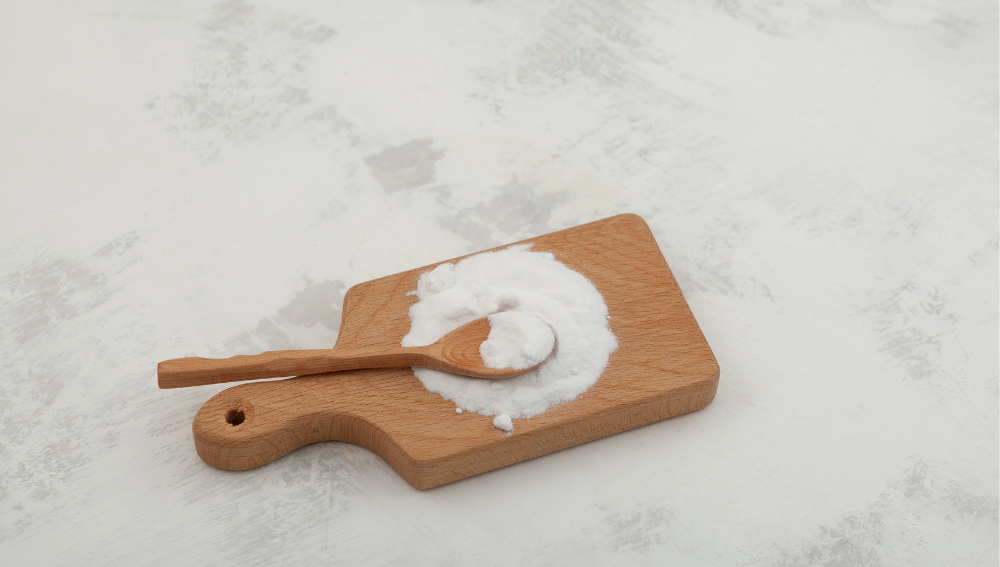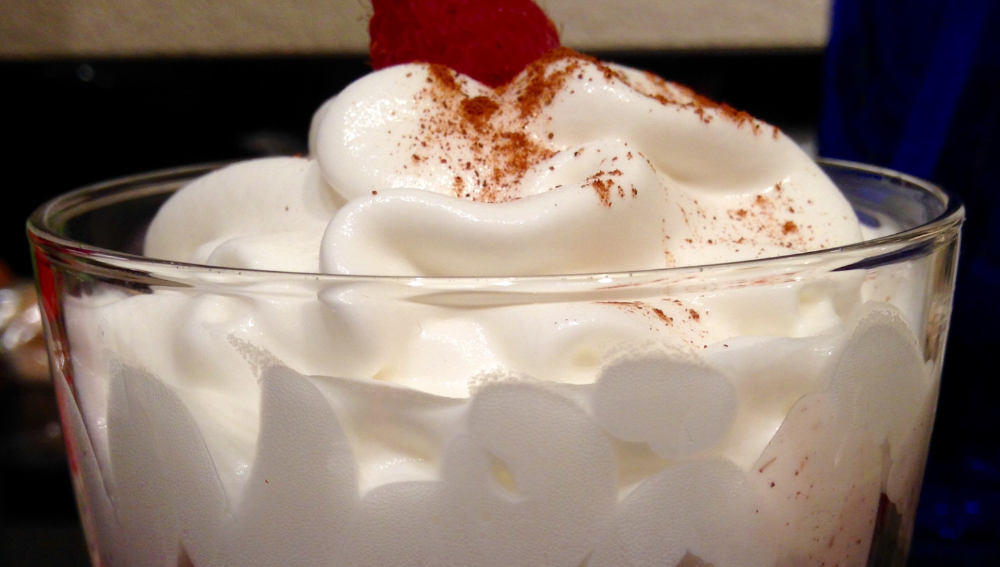I love cooking with nutmeg, and I’m always amazed by how much it can enhance the flavor of my dishes. Nutmeg is a versatile spice that can be used in both sweet and savory dishes, and it has a unique taste that’s hard to describe.
If you’re wondering what nutmeg tastes like, you’re not alone. Many people are curious about this spice, and in this article, I’ll do my best to answer that question.
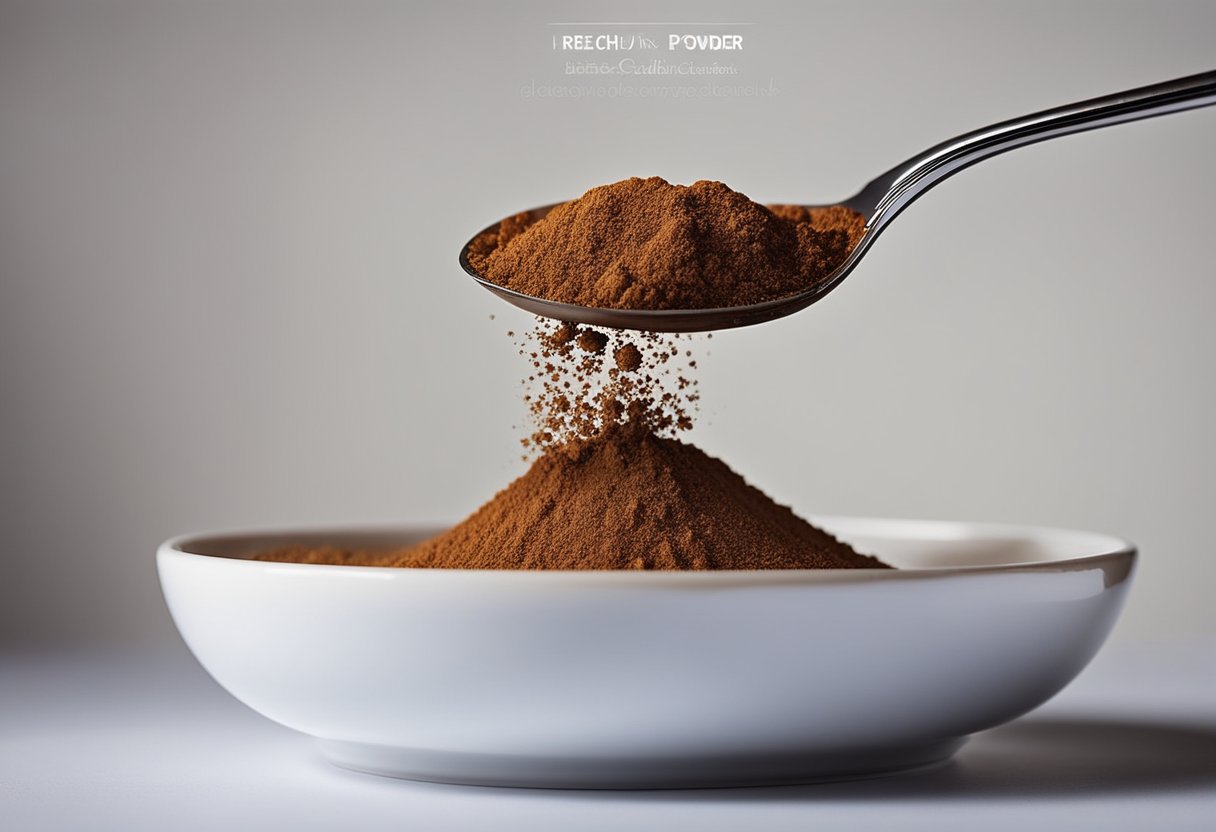
Nutmeg is a warm and aromatic spice that’s native to Indonesia. It’s made from the seed of the nutmeg tree, which is dried and ground into a powder.
Nutmeg has a complex flavor profile that’s both sweet and savory, with hints of cinnamon, clove, and pepper. It’s often used in baking, but it’s also a popular spice in savory dishes like soups, stews, and meat dishes.
Key Takeaways
- Nutmeg has a warm and aromatic flavor that’s both sweet and savory, with hints of cinnamon, clove, and pepper.
- It’s a versatile spice that can be used in both sweet and savory dishes, and it’s often used in baking, soups, stews, and meat dishes.
- Nutmeg is native to Indonesia and is made from the seed of the nutmeg tree. It has a complex flavor profile that’s hard to describe but is essential in many cuisines around the world.
Understanding Nutmeg
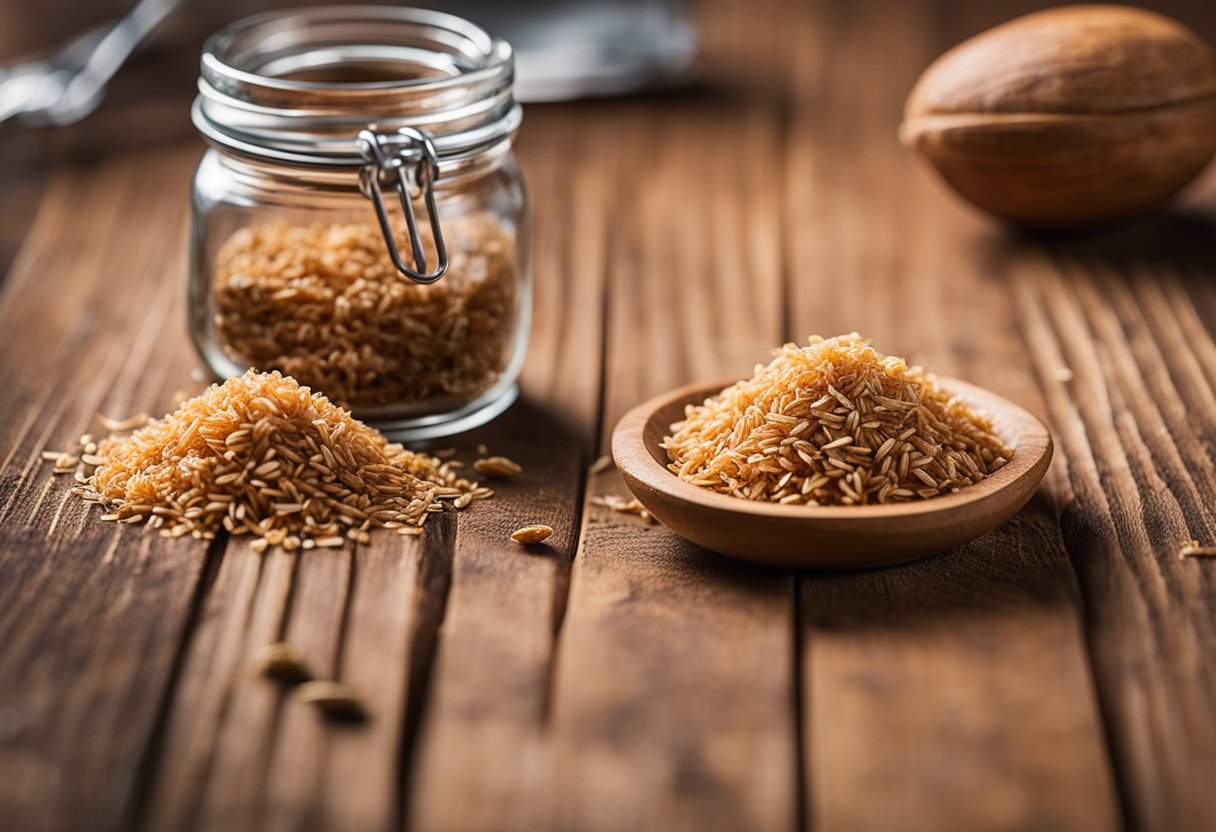
As a spice, nutmeg is known for its warm, sweet, and slightly bitter taste. It is derived from the seed of the nutmeg tree, scientifically known as Myristica fragrans.
The tree is native to Indonesia and is widely cultivated in the tropics, including India, Sri Lanka, and the Caribbean.
The nutmeg seed is oval-shaped and about 1 inch in length. It is covered by a hard outer shell, which is removed to reveal the whole nutmeg.
The nutmeg seed has a brownish-red color and a rough texture. It is usually sold as whole nutmeg or ground nutmeg.
Whole nutmeg has a stronger flavor than ground nutmeg because it retains its essential oils, which are lost during the grinding process.
Ground nutmeg, on the other hand, is more convenient to use and is commonly found in most grocery stores.
Nutmeg contains a compound called myristicin, which gives it its unique flavor and aroma. Myristicin is also responsible for the numbing sensation that nutmeg can produce when consumed in large amounts.
Nutmeg is a versatile spice that can be used in both sweet and savory dishes. It pairs well with other warm spices like cinnamon, cloves, and ginger.
It is commonly used in baked goods like cakes, pies, and cookies, as well as in savory dishes like soups, stews, and sauces.
Overall, nutmeg is a flavorful spice that adds depth and warmth to any dish. Whether you use whole nutmeg or ground nutmeg, it is sure to enhance the flavor of your food.
The Taste Profile of Nutmeg
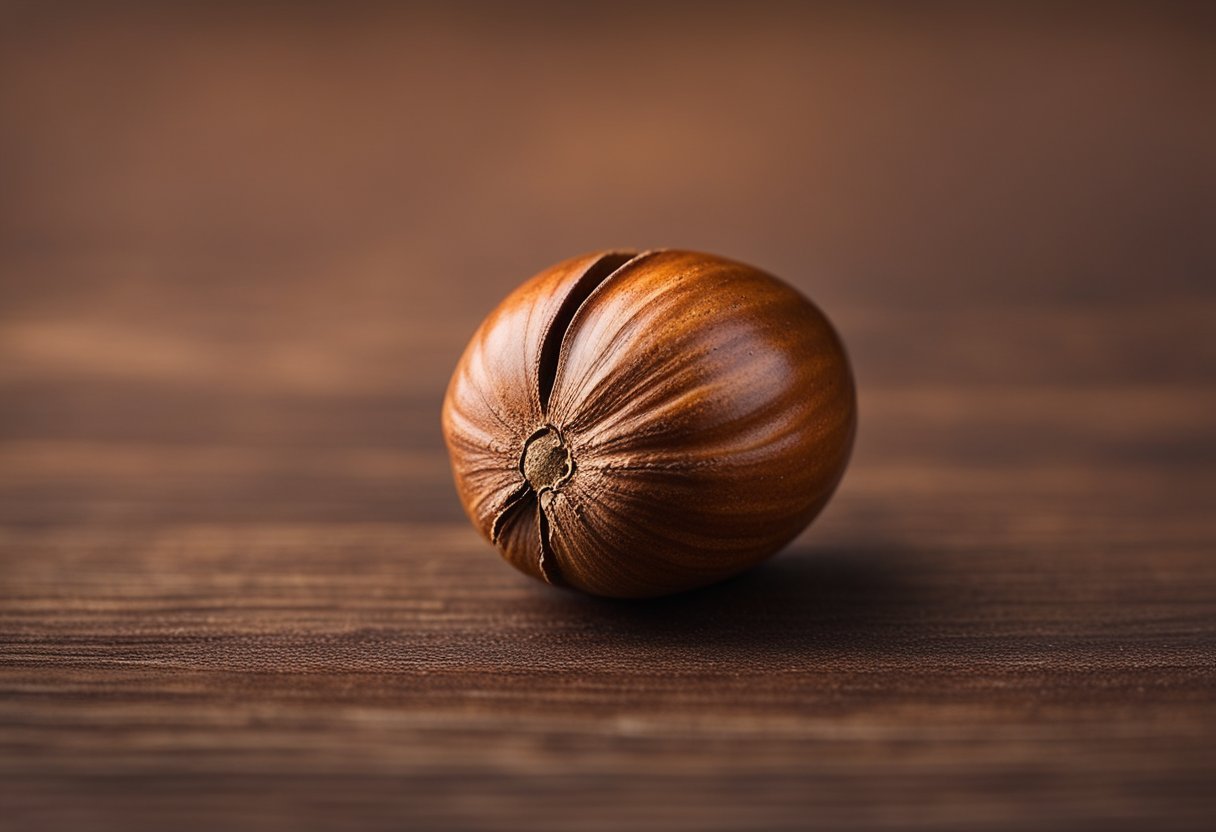
As someone who has tasted nutmeg before, I can confidently say that nutmeg has a unique and distinct taste profile that is difficult to describe. Nutmeg has a warm, sweet, and slightly nutty flavor that is very aromatic and slightly bitter.
When you taste nutmeg, you will notice that it has a light sweetness to it that is not overpowering. The sweetness is balanced out by a warm and slightly spicy flavor that is reminiscent of cloves.
Nutmeg also has a savory and nutty taste that is very unique and hard to describe.
In terms of its aroma, nutmeg has a very earthy and cozy scent that is similar to a hike in the woods after it has rained. The aroma is also slightly peppery and spicy, which adds to its warmth.
Overall, nutmeg is a spice that has a very complex and unique taste profile. It is sweet, warm, spicy, nutty, and earthy all at the same time, which makes it a very versatile ingredient in many different recipes.
Nutmeg in Culinary Use
Nutmeg is a versatile spice that can be used in both sweet and savory dishes. It has a warm, sweet, and nutty flavor that is often described as a combination of cinnamon and cloves.
Here are some ways to use nutmeg in your culinary creations:
- Baking: Nutmeg is a common ingredient in many baked goods, such as cakes, cookies, and pies. It pairs well with other fall spices like cinnamon, ginger, and allspice. You can also sprinkle some nutmeg on top of your baked goods for an extra burst of flavor.
- Eggnog and Pumpkin Pie: Nutmeg is a key ingredient in both eggnog and pumpkin pie. It adds a warm and spicy flavor to these classic holiday treats.
- Garam Masala: Nutmeg is one of the spices used in garam masala, a popular spice blend used in Indian cuisine. It adds a warm and sweet flavor to curries and other savory dishes.
- Soups and Gratin: Nutmeg can be used to flavor creamy soups and vegetable gratins. It pairs well with cheese and cream-based sauces.
- Bolognese and Chicken Rub: Nutmeg can also be used to flavor meat dishes. It pairs well with ground beef in Bolognese sauce and can be used in a rub for chicken.
- Mac and Cheese: Nutmeg can be added to mac and cheese for a warm and comforting flavor. It pairs well with cheddar cheese and breadcrumbs.
- Cocktails: Nutmeg can be used to garnish cocktails, such as mulled wine and eggnog. It adds a warm and spicy aroma to the drink.
Overall, nutmeg is a versatile spice that can add warmth and depth to a variety of dishes. When using nutmeg, it’s important to use it in moderation as it can be overpowering if used in large quantities.
Comparing Nutmeg with Other Spices
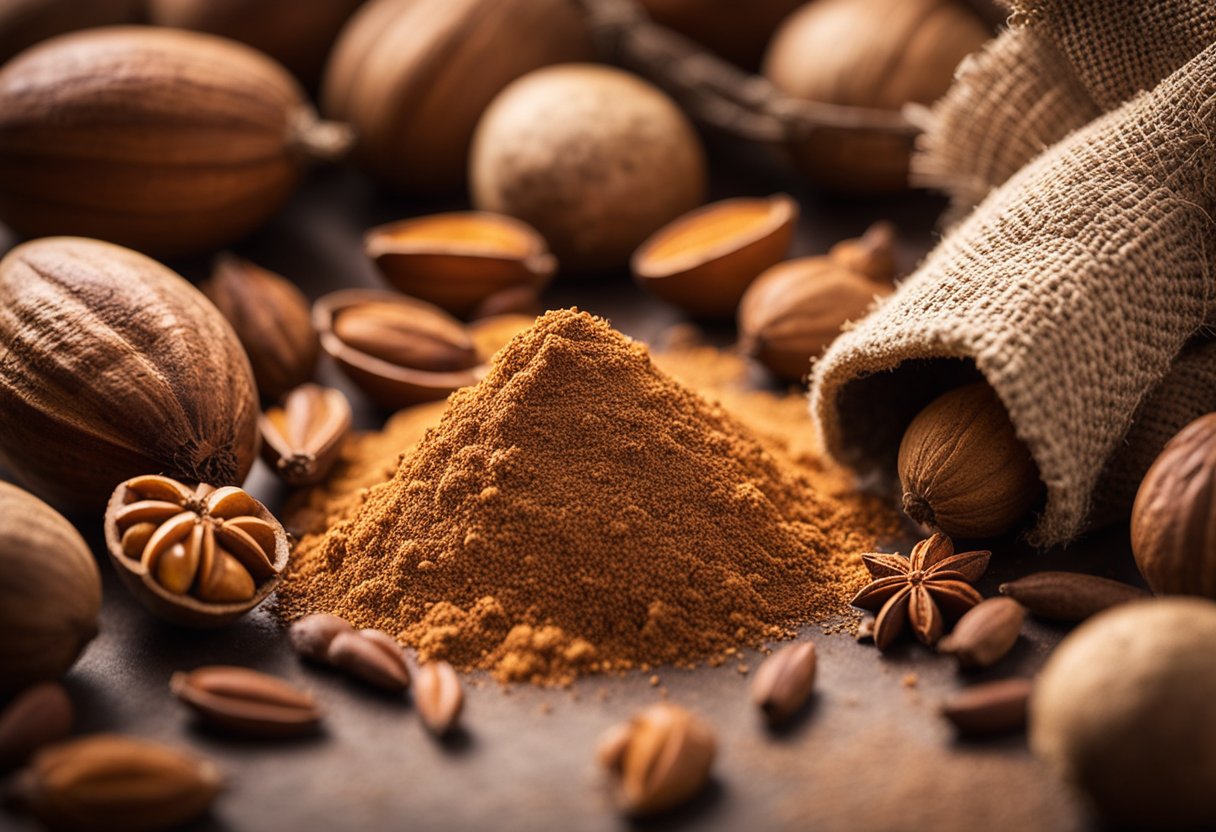
When it comes to spices, nutmeg is often compared with other popular spices such as cinnamon, pepper, mace, clove, pumpkin pie spice, cloves, allspice, and ras el hanout.
While these spices share some similarities, they each have their unique flavor profiles and uses.
Cinnamon is a sweet and warm spice that is often used in baking, particularly in sweet dishes such as apple pie and cinnamon rolls.
Nutmeg, on the other hand, has a slightly sweet and nutty flavor with a warm and earthy taste. It is also used in baking, but can also be used in savory dishes such as soups and stews.
Pepper is a common spice used in many dishes, and it has a sharp and spicy taste. Nutmeg, on the other hand, has a more subtle flavor that is often described as warm and earthy.
Mace, which is made from the outer coating of the nutmeg seed, has a similar flavor profile to nutmeg but is slightly more delicate.
Clove is a spice that is often used in baking, particularly in sweet dishes such as gingerbread and fruitcake. It has a strong, sweet, and slightly bitter flavor.
Nutmeg, on the other hand, has a more subtle flavor that is often used to enhance the flavors of other spices and ingredients in a dish.
Pumpkin pie spice is a blend of spices that includes cinnamon, nutmeg, cloves, and allspice. It is often used in pumpkin pies and other fall desserts.
While nutmeg is a key component of pumpkin pie spice, it has a more distinct flavor profile than the other spices in the blend.
Allspice is a spice that is often used in Caribbean and Middle Eastern cuisine. It has a warm and spicy flavor that is similar to a blend of cinnamon, nutmeg, and cloves.
Ras el hanout is a North African spice blend that can include up to 30 different spices, including nutmeg, cinnamon, and allspice.
Overall, while nutmeg shares some similarities with other popular spices, its unique flavor profile and versatility make it a staple in many kitchens.
How to Use Nutmeg
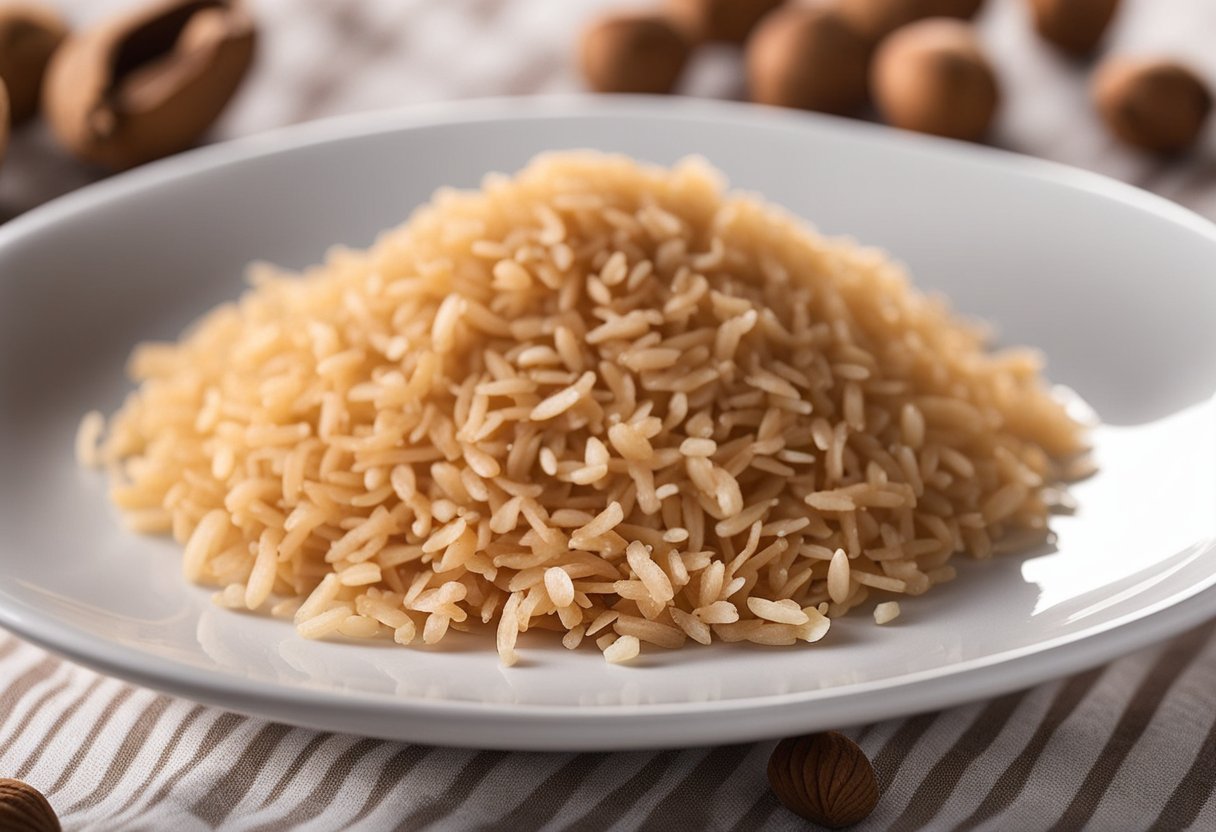
As someone who has used nutmeg in my cooking for years, I can confidently say that it is a versatile spice that can be used in both sweet and savory dishes. Here are some tips on how to use nutmeg effectively in your cooking:
Grating Nutmeg
Freshly grated nutmeg has a more intense flavor than pre-ground nutmeg. To grate nutmeg, you can use a nutmeg grater or a microplane.
I personally prefer using a microplane because it produces a fine powder that is easy to incorporate into dishes.
Powdered Nutmeg
If you don’t have a nutmeg grater or a microplane, you can use pre-ground nutmeg. However, keep in mind that pre-ground nutmeg loses its flavor more quickly than whole nutmeg.
It’s best to buy small quantities of pre-ground nutmeg and use it within a few months.
Small Quantities
Nutmeg is a potent spice, so a little goes a long way. It’s best to start with a small amount and add more as needed. For most recipes, a pinch of nutmeg is enough to add flavor without overpowering the dish.
Garnish
Nutmeg can also be used as a garnish. Grate a little nutmeg over your latte or hot chocolate for a cozy touch. You can also sprinkle nutmeg over roasted vegetables or mashed potatoes for a warm, earthy flavor.
Powder Form
Nutmeg can be used in both powder and whole form. Powdered nutmeg is easier to use, but whole nutmeg has a longer shelf life and can be grated for a fresher flavor.
If you’re using whole nutmeg, keep it in an airtight container in a cool, dry place.
Overall, nutmeg is a versatile spice that can add warmth and depth to both sweet and savory dishes. By following these tips, you can use nutmeg effectively in your cooking and take your dishes to the next level.
Buying and Storing Nutmeg
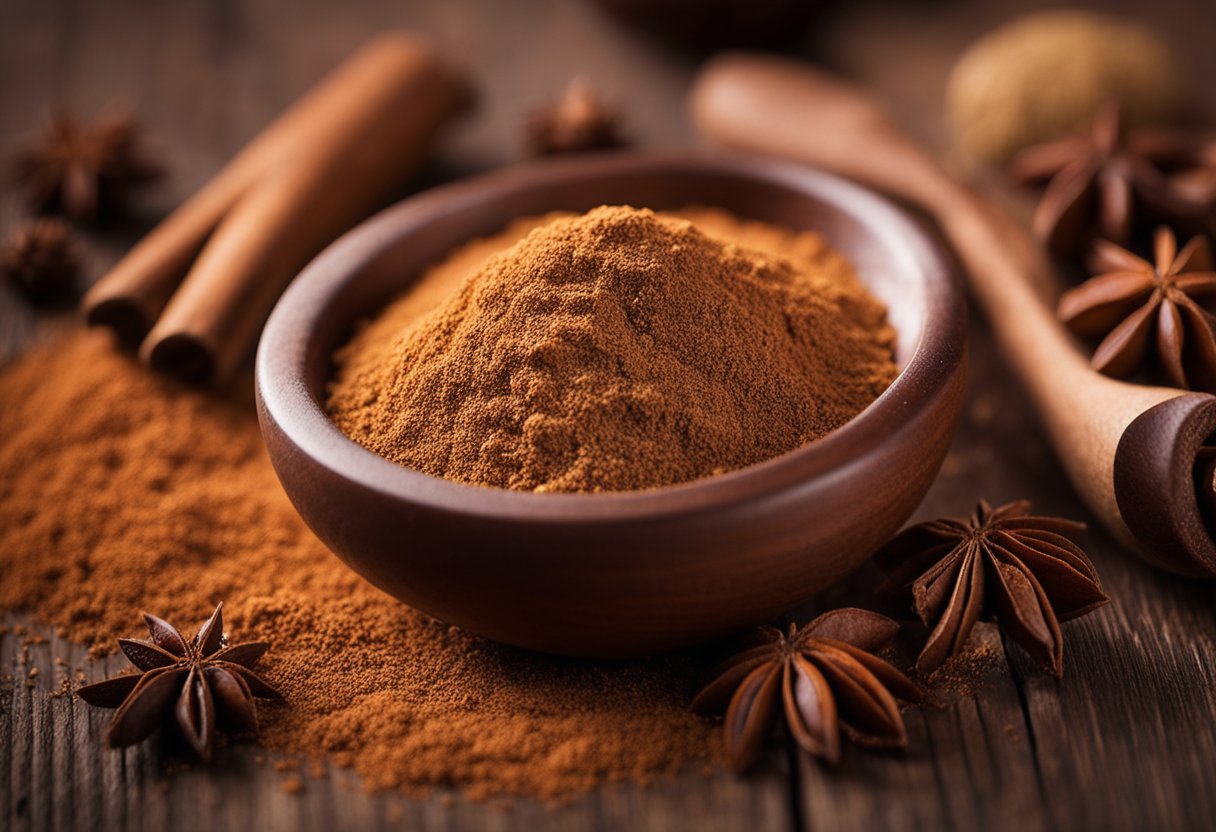
When it comes to buying nutmeg, you can find it in most grocery stores in the spice aisle. Look for whole nutmegs rather than pre-ground nutmeg as the whole nutmegs retain their flavor for a longer time.
The whole nutmegs can be grated with a nutmeg grater or a microplane when you need to use them.
When storing nutmeg, make sure to keep it in an airtight container to prevent moisture from getting in. Moisture can cause the nutmeg to lose its flavor and aroma.
You can store whole nutmegs for up to 2 years, while pre-ground nutmegs only last for about 6 months.
If you’re unsure about the freshness of your nutmeg, you can do a quick test to check. Simply scratch the surface of the nutmeg with your fingernail or a knife.
If the aroma is strong and spicy, then it’s still fresh. If the aroma is weak, then it’s time to replace it.
In summary, when buying nutmeg, opt for whole nutmegs rather than pre-ground nutmegs. Store nutmeg in an airtight container to prevent moisture from getting in and causing it to lose its flavor and aroma.
Check the freshness of your nutmeg by scratching the surface and checking the aroma.
Nutmeg’s Origin and Production
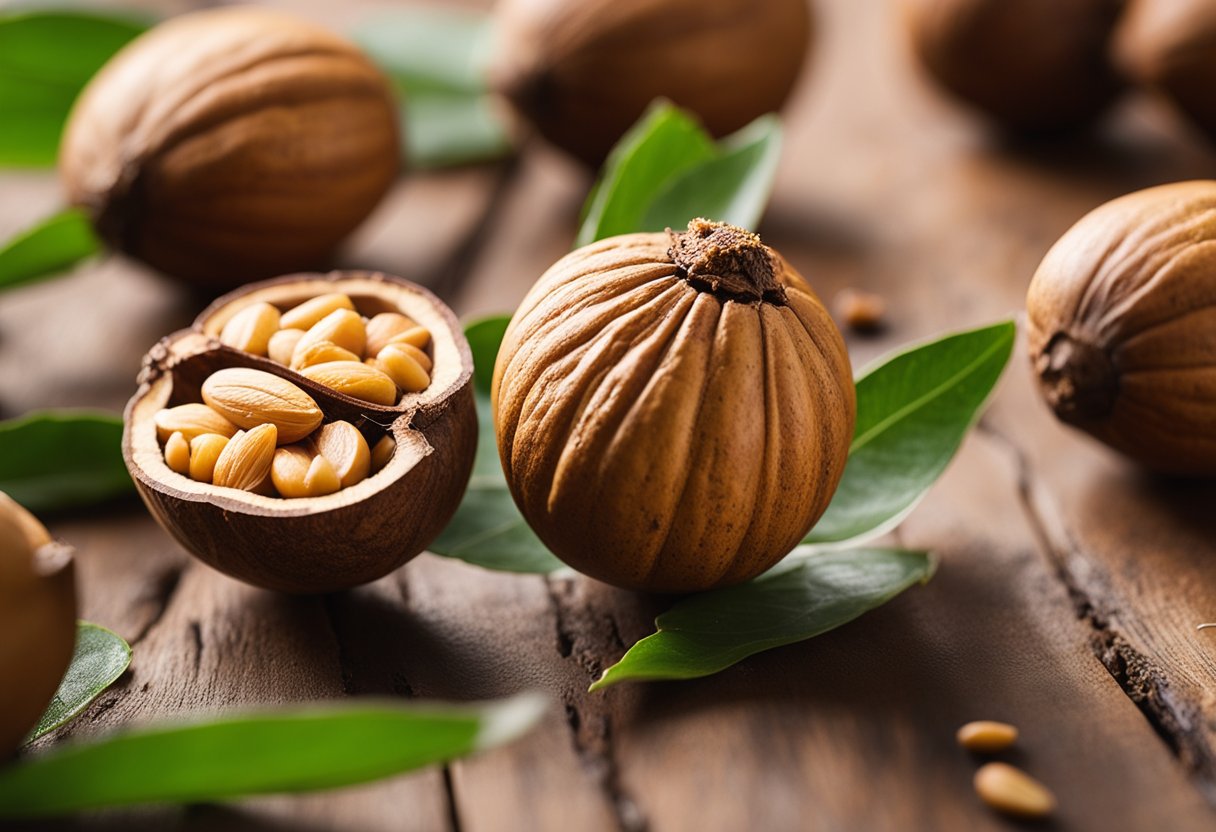
Nutmeg is a spice that has been used for centuries in various cuisines around the world. The nutmeg tree, scientifically known as Myristica fragrans, is native to the Banda Islands, which are part of Indonesia.
The tree thrives in tropical climates and is also cultivated in Sri Lanka, Grenada, and other parts of the world.
The Dutch played a significant role in the nutmeg trade during the colonial era. They established a monopoly on the production and distribution of nutmeg in the Banda Islands, which allowed them to control the market and keep prices high.
The Dutch East India Company was responsible for the production and export of nutmeg from the Banda Islands.
Today, Indonesia is still the largest producer of nutmeg, followed by Grenada and Sri Lanka. Nutmeg is harvested by hand when the fruit reaches maturity.
The fruit is then split open to reveal the nutmeg seed, which is dried in the sun or in a drying machine. The dried seeds are then sorted, graded, and packaged for export.
The quality of nutmeg depends on various factors, including the age of the tree, the climate, and the soil. Nutmeg from the Banda Islands is considered to be of the highest quality due to the unique soil and climate conditions found in that region.
In Indonesian cuisine, nutmeg is used in a variety of dishes, including soups, stews, and curries. It is also used in sweet dishes such as cakes, cookies, and custards.
In Western cuisine, nutmeg is often used in baked goods, such as pies, cakes, and bread.
Overall, nutmeg is a versatile spice with a rich history and a unique flavor. Its production and distribution have evolved over the centuries, but it remains an important ingredient in many cuisines around the world.
Health Benefits of Nutmeg
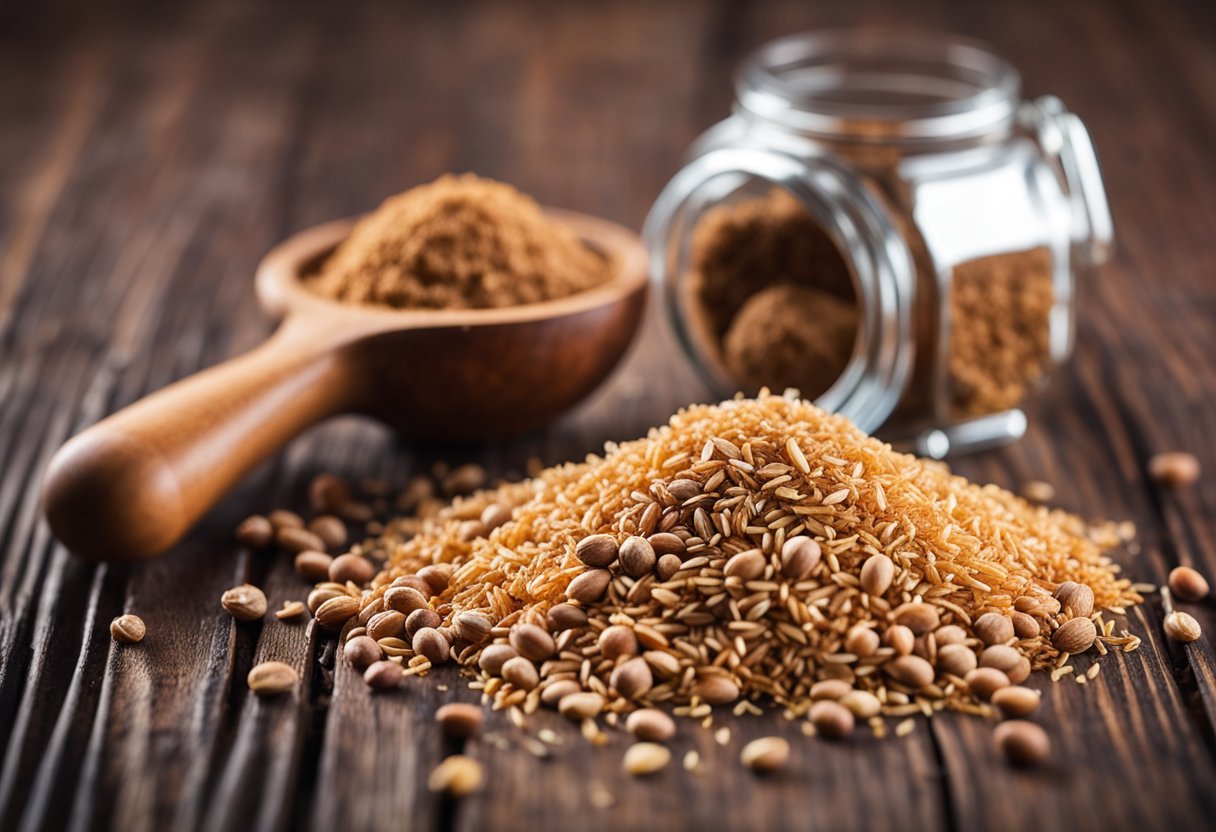
As a spice, nutmeg is more commonly known for its flavor than its health benefits. However, nutmeg boasts an array of compounds that may promote your health. Here are some of the health benefits of nutmeg:
Antibacterial Properties
Nutmeg has antibacterial properties that may help protect against harmful bacteria. Nutmeg essential oil, in particular, has been found to be effective against a variety of bacteria, including Staphylococcus aureus and Escherichia coli.
These bacteria can cause infections and illnesses, so nutmeg may be a useful tool in preventing them.
Anti-inflammatory Properties
Nutmeg has anti-inflammatory properties that may help reduce inflammation in the body. Chronic inflammation has been linked to a variety of health problems, including heart disease, cancer, and Alzheimer’s disease.
By reducing inflammation, nutmeg may help protect against these conditions.
Myristicin Content
Nutmeg contains a compound called myristicin, which has been found to have a variety of health benefits. Myristicin has been shown to have analgesic (painkiller) properties, which may help relieve chronic pain such as osteoarthritis or menstrual cramps.
Myristicin has also been found to have sedative properties, which may help promote relaxation and sleep.
Overall, while nutmeg is not a cure-all, it does offer a variety of potential health benefits. Incorporating nutmeg into your diet may be a simple and tasty way to support your overall health and well-being.
Nutmeg in Traditional Medicine
Nutmeg has been used in traditional medicine for centuries due to its numerous health benefits. Here are some of the ways nutmeg has been used in traditional medicine:
Pain Relief
Nutmeg has been used as a natural pain reliever for centuries. It contains a compound called myristicin, which has been found to have analgesic properties.
Myristicin works by blocking the production of prostaglandins, which are responsible for causing pain and inflammation in the body.
Nutmeg oil is often used topically to provide relief from joint pain, muscle pain, and headaches.
Aphrodisiac
Nutmeg has been used as an aphrodisiac for centuries. It is believed to stimulate the production of sex hormones, which can increase libido and sexual function.
Nutmeg is often used in traditional medicine to treat sexual dysfunction and impotence.
Other Uses
In addition to pain relief and aphrodisiac properties, nutmeg has been used in traditional medicine to treat a variety of other ailments, including:
- Digestive issues: Nutmeg has been used to treat digestive issues such as indigestion, bloating, and diarrhea.
- Insomnia: Nutmeg has sedative properties and has been used to treat insomnia and other sleep disorders.
- Respiratory issues: Nutmeg has been used to treat respiratory issues such as coughs and asthma.
It is important to note that while nutmeg has been used in traditional medicine for centuries, scientific research on its effectiveness and safety is limited. It is always best to consult with a healthcare professional before using nutmeg or any other natural remedy for medicinal purposes.
Nutmeg Allergies
As with any food, some people may have an allergic reaction to nutmeg. Nutmeg allergy is not very common, but it can cause serious symptoms in some people. Here are some things to keep in mind if you have a nutmeg allergy.
What are the symptoms of nutmeg allergy?
Nutmeg allergy symptoms can range from mild to severe. Mild symptoms may include itching, hives, and swelling of the face, lips, tongue, or throat.
More severe symptoms may include difficulty breathing, wheezing, and anaphylaxis, which can be life-threatening.
Who is at risk for nutmeg allergy?
Anyone can develop a nutmeg allergy, but it is more common in people with other food allergies or allergies to pollen or dust. If you have a history of allergies, you may be at higher risk for developing a nutmeg allergy.
How is nutmeg allergy diagnosed?
If you suspect that you have a nutmeg allergy, you should see an allergist for testing. The allergist may perform a skin prick test or a blood test to determine if you are allergic to nutmeg.
How is nutmeg allergy treated?
The best way to treat nutmeg allergy is to avoid nutmeg and any foods or products that contain nutmeg.
If you accidentally consume nutmeg and experience symptoms, you may need to take an antihistamine or use an epinephrine auto-injector if your symptoms are severe.
What foods and products contain nutmeg?
Nutmeg is a common spice that is used in many sweet and savory dishes, including eggnog, pumpkin pie, and meat dishes. It can also be found in some cosmetics and fragrances.
Conclusion
If you have a nutmeg allergy, it is important to be aware of the foods and products that contain nutmeg and to take steps to avoid them. If you experience symptoms of an allergic reaction, seek medical attention immediately.
Nutmeg in Different Cuisines
Nutmeg is a versatile spice that is used in a variety of cuisines around the world. Its unique flavor and aroma make it a popular ingredient in both sweet and savory dishes.
Here are a few examples of how nutmeg is used in different cuisines:
Caribbean Cuisine
In the Caribbean, nutmeg is a staple spice that is used in a variety of dishes. It is often combined with other spices like allspice and cinnamon to create a flavorful seasoning blend.
Nutmeg is also used in sweet dishes like rum cake and eggnog.
Guatemalan Cuisine
In Guatemalan cuisine, nutmeg is used in a traditional dish called “jocon.” This dish is made with chicken and a sauce made from tomatillos, pumpkin seeds, and spices like nutmeg and cumin.
The nutmeg adds a warm, slightly sweet flavor to the dish.
Italian Cuisine
In Italian cuisine, nutmeg is often used in creamy pasta sauces like alfredo and carbonara. It is also used in meat dishes like meatballs and meatloaf to add flavor and depth.
French Cuisine
In French cuisine, nutmeg is used in a variety of dishes including quiche, gratins, and soufflés. It is also used in the classic béchamel sauce, which is the base for many creamy sauces.
Indian Cuisine
In Indian cuisine, nutmeg is used in a variety of dishes including biryani, korma, and masala chai. It is also used in sweet dishes like kheer, a rice pudding flavored with nutmeg and cardamom.
Overall, nutmeg is a versatile spice that can be used in a wide variety of dishes. Its warm, slightly sweet flavor and aroma make it a popular ingredient in many different cuisines around the world.
Using Nutmeg in Specific Dishes
When it comes to cooking with nutmeg, the possibilities are endless. This versatile spice can be used in both sweet and savory dishes, adding a warm and earthy flavor to any recipe.
Here are some specific dishes where nutmeg can be used to enhance the flavor:
Mashed Potatoes
Adding nutmeg to mashed potatoes can give them a unique and delicious flavor. Simply add a pinch of nutmeg to the potatoes while mashing them.
Nutmeg pairs well with potatoes and can add a warm and cozy flavor to this classic dish.
Butternut Squash Soup
Butternut squash soup is a popular fall dish that can be made even better with the addition of nutmeg. Nutmeg pairs well with the sweet and earthy flavor of butternut squash, and can add a warm and spicy note to the soup.
Simply add a pinch of nutmeg to the soup while cooking.
Alfredo Sauce
Nutmeg can be used to enhance the flavor of alfredo sauce. Add a pinch of nutmeg to the sauce while cooking to give it a warm and earthy flavor.
Nutmeg pairs well with the creamy and cheesy flavor of alfredo sauce, making it a perfect addition to this classic Italian dish.
Bechamel Sauce
Bechamel sauce is a classic French sauce that can be made even better with the addition of nutmeg.
Nutmeg pairs well with the creamy and rich flavor of bechamel sauce, adding a warm and spicy note to the sauce. Simply add a pinch of nutmeg to the sauce while cooking.
Vegetables
Nutmeg can be used to add flavor to a variety of vegetables. Simply sprinkle a pinch of nutmeg over steamed or roasted vegetables, such as carrots, broccoli, or cauliflower, to give them a warm and earthy flavor.
Meats
Nutmeg can also be used to enhance the flavor of meats. Simply sprinkle a pinch of nutmeg over meats, such as chicken or pork, before cooking to give them a warm and spicy flavor.
Sweet Potato
Nutmeg pairs well with the sweet and earthy flavor of sweet potatoes. Simply sprinkle a pinch of nutmeg over roasted or mashed sweet potatoes to give them a warm and cozy flavor.
In conclusion, nutmeg is a versatile spice that can be used to add flavor to a variety of dishes.
Whether you’re cooking with potatoes, butternut squash, vegetables, bechamel, butternut squash soup, alfredo, mashed potatoes, sweet potato, meats, or sauces, nutmeg can enhance the flavor of your recipe and take it to the next level.
Frequently Asked Questions
What is the flavor profile of nutmeg?
Nutmeg has a warm, slightly sweet, and earthy flavor profile. It also has a slightly bitter taste and a spicy aroma. The flavor is often described as peppery, cozy, or even slightly spicy.
How does nutmeg taste when used in cooking?
When used in cooking, nutmeg adds a warm and comforting flavor to dishes. It can enhance the flavor of both sweet and savory dishes.
Nutmeg is often used in baking, especially in recipes for pies, cakes, and cookies. It can also be used to flavor sauces, soups, and stews.
What are some common uses of nutmeg?
Nutmeg is a versatile spice that can be used in a variety of dishes. It is often used in sweet dishes such as pumpkin pie, apple pie, and eggnog.
It can also be used to flavor savory dishes such as meatloaf, roasted vegetables, and cream sauces.
What are the side effects of consuming nutmeg?
Consuming large amounts of nutmeg can cause hallucinations, nausea, and dizziness. It can also cause dry mouth, flushing, and a rapid heartbeat. It is important to use nutmeg in moderation and to avoid consuming large amounts of it.
Is nutmeg similar in taste to cinnamon?
Nutmeg and cinnamon have different flavor profiles, but they can be used together to enhance the flavor of dishes. Nutmeg has a warm, slightly sweet, and earthy flavor, while cinnamon has a sweet and spicy flavor.
What types of dishes pair well with nutmeg?
Nutmeg pairs well with a variety of dishes, including sweet and savory dishes. It is often used in baking, especially in recipes for pies, cakes, and cookies.
It can also be used to flavor sauces, soups, and stews. Nutmeg is a common ingredient in dishes such as pumpkin pie, apple pie, and eggnog. It can also be used to flavor meatloaf, roasted vegetables, and cream sauces.




